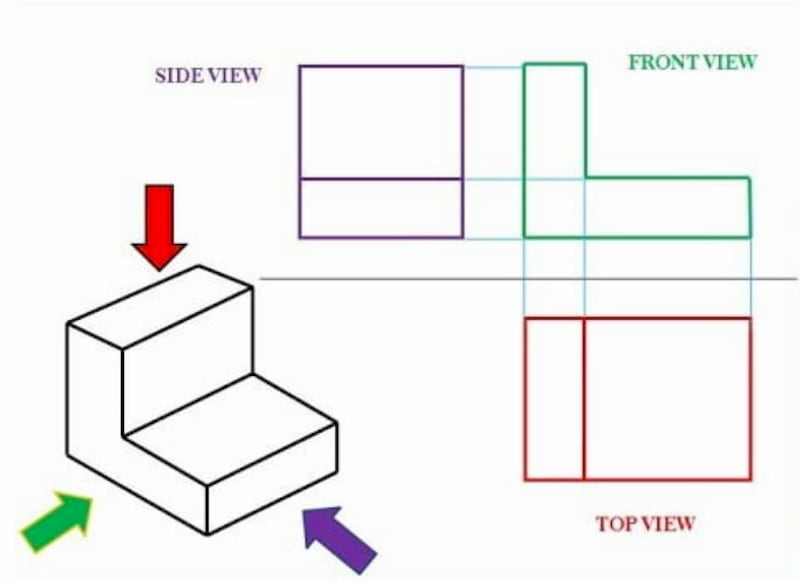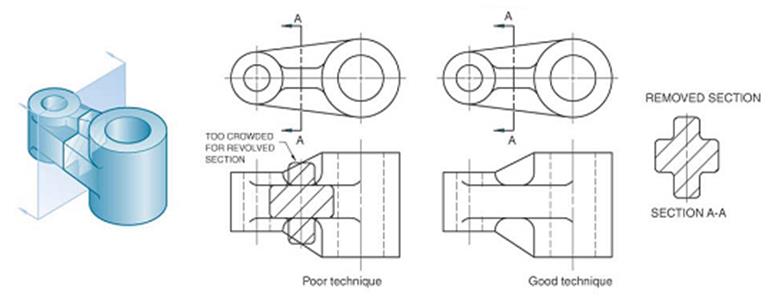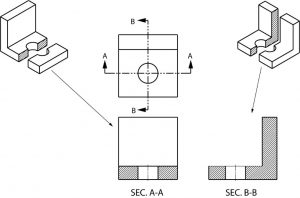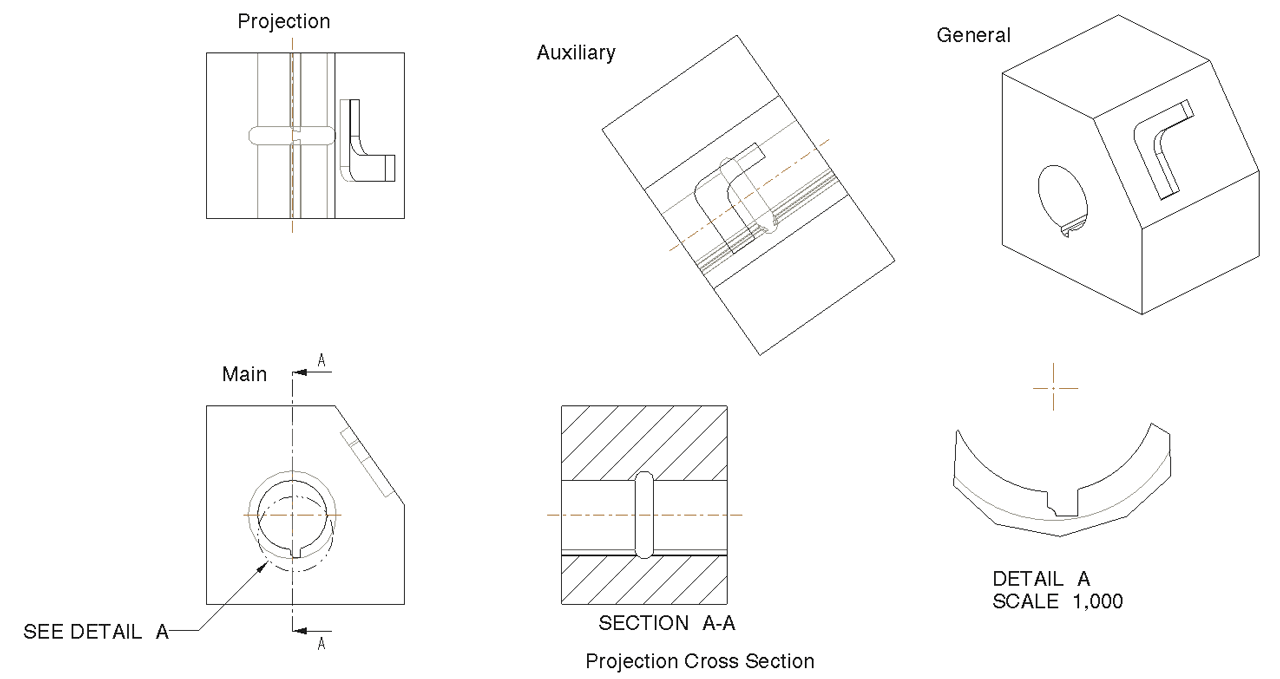Sectional views are used in technical drawing to expose internal surfaces. Full View Shows the entire model.

Engineering Drawing Views Basics Explained Fractory
When specific features of an object that need highlighting are not located.

. Section lines are used to indicate where the cutting plane cuts the material. Section lines are thin lines. In this view the cutting plane is assumed to bend at a right angle and cuts through only half of the.
You select the orientation of the view when you create it. Figure 20 - Front view and half section. Full section in a full section the cutting plane line passes fully through the part.
Projected View An orthographic or isometric. - इजनयरग डरइग म सकशन क परकर 1. Half View Shows only the portion of the model on one side of a datum plane.
A half-section is a view of an object showing one-half of the view in section as in figure 19 and 20. You can create one or more base views on a drawing sheet. The lines are thin and are usually drawn.
In this type of section only half of the space or object is cut away. This is the most common section called a full section with the imaginary laser cutting a line across. The three main types of pictorial drawings that are extensively used in architectural presentations are perspective drawings isometric drawings and oblique drawings.
6 Types of sectional views Full sections. Gaskets seals Do not show hidden detail in sectional view. Section lines are used to define areas that represent where solid material has been cut in a sectional view.
Half sections or views. Partial or Broken Out Section 4. What is Half Section.
The main difference between isometric and typical perspective drawings is that in the latter the lines recede to vanishing points. A section is used to show the detail of a component or an assembly on a particular plane which is known as the cutting plane. What is Full Section.
Features that cannot be seen by hidden detail Cutting plane removes part section is what is left Cross hatching ois at 45 equispaced Centrelines often used for cutting planes Very thin sections not hatched eg. REVOLVED SECTION VIEW Revolved sections show cross-sectional features of a part. Full section The view obtained even the cutting plane is right across the object.
The base view is the source for subsequent views and controls the scale and alignment for them. There is no cutting plane line. The line that separates the different types interior and exterior may be a.
An elevation drawing is a view taken from a point outside the object without any slicing. The scale of section drawings may range from y to 3 317 mm to 76 mm depending upon the size of the drawing paper the size of the building or component and the desired features to be shown. Normally a view is replaced with the full section view.
EvaluateManufacture a Final Product Activity Types of Engineering Drawings Top view Side elevation Hand-drawn engineering drawing of a bench Traditional blueprint of building design Exploded view drawing of bathroom exhaust fan Student CAD drawings Modern CAD drawings. Types of Sectional Views Full Section. BROKEN-OUT SECTION VIEW A break line is used to separate the sectioned portion from the unsectioned portion of the view.
A cutting plane line shows where object was cut to obtain the section view. A simple bracket is shown in Fig. You have learned that when making a multiview sketch hidden edges and surfaces are usually shown with hidden dash lines.
A second type of revolved section in Fig. 6 types of engineering drawings. Process flow diagrams control diagrams piping and instruments diagrams and single line diagrams etc all the drawings are normally prepared in plan and different section views usually to the scale in order to provide complete information of the drawing object.
They serve to present additional orthographic views of surfaces. 81 and it is required to draw three sectional viewsAssume that you had a bracket and cut it with a hacksaw along the line marked B-B. Types of Engineering Drawings Design Step 6.
89 shows a case where it is required to indicate details on two separate intersecting planes. This is a convenient convention to use on single view drawings because the shape could not be confirmed without projecting a second view or an added note. Broken View Removes sections from large objects between two points and moves the remaining sections close together.
No need for additional orthographic views. The cross section at that point. These lines are called section lining or cross-hatching.
Partial View Shows only the portion of the view that is contained within a boundary. A section drawing is a view taken after you slice an object then look at the surface created by the slicing. Engineering Graphics with AutoCAD 2011 1e James Bethune.
Here is an object sectioned from two different directions. Lines Used in Section Views ¾Section Lines. Types of Section in Engineering Drawing.
K half section The view Obtained When the cutting plane goes half way across the Object to the centre line. The default orientations are based on the origin in the digital prototype. A revolving view is effective for elongated objects or.
In both cases the object should be standing on its base when the. Break line is a thin continuous line and is drawn freehand. The cutting-plane line cuts halfway through the part and removes one quarter of the material.
There are three major types of sections used in engineering drawing. Figure 19 - Full and sectioned isometric views. The specific information a section shows may vary depending on whether it is a design or construction drawing.
Section lines are evenly. Half sections are commonly used to show both the internal and outside view of symmetrical objects. A full section is the most widely-used sectional view.
Sectional views in engineering technical drawings Half Sectional views. The diagonal lines on the section drawing are used to indicate the area that has been theoretically cut. Half Section is used to the exterior and interior of the part in the same view.
A cutting plane does not necessarily need to cut the whole object. Section line symbols are chosen according to the material of the object Section lines are generally drawn at a 45 angle. There are three major types of sections used in engineering drawing.
Except a few category of drawings eg. A short series of lectures on Engineering Drawing as Part of ENGG1960 By Paul Briozzo.

Sectional Views Basic Blueprint Reading

Sectioning Technique Engineering Design Mcgill University

Design Handbook Engineering Drawing And Sketching Related Resources Design And Manufacturing I Mechanical Engineering Mit Opencourseware


0 comments
Post a Comment